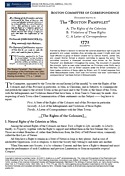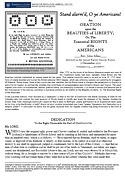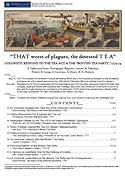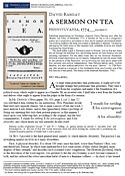CRISIS
6. 1772-73: Crisis Renewed
- Boston Committee of Correspondence, the "Boston Pamphlet," 1772, selections PDF
- Rev. John Allen, An Oration upon the Beauties of Liberty, sermon after the Gaspée incident, 1772, selections PDF
- Colonists respond to the Tea Act & the Boston Tea Party, 1773-1774 PDF compilation
- David Ramsay, A Sermon on Tea, essay, 1774 PDF




A. TO USE NO TEA, at least for the present, for if any person should give to the sellers more than the usual price for tea, he ought to be held up as a mortal enemy to American freedom.
"An Old Prophet," "Queries Respecting the Tea Act,"
The New-York Gazetteer, 2 Dec. 1773
With Parliament's repeal of most of the Townshend duties, and as the shock of the Boston Massacre eased, an uneasy peace existed for two years. But in 1772 two policy moves by Britain spurred virulent protest in the colonies. First, Britain removed the colonies' authority to pay the salaries of the royal governors, judges, and other officials, thereby obliterating the most potent tool the colonies held to influence royal officials—the "power of the purse." Second, Britain threatened to send Americans accused of destroying a British ship to England for trial, thereby holding hostage a long-cherished right of Englishmen —the right to trial by a jury of one's peers. The cycle of action and reaction was rekindled, to ignite explosively in 1773 with a seemingly innocuous tax on tea. "Why, we may ask, did this convulsive reaction occur," posits historian Robert Middlekauff, "destroying private property, provoking a fresh defiance of Parliament, and once more pulling American colonies together?"1 We pursue this question with readings that illustrate the colonists' renewed sense of crisis, vulnerability, and rebellion from 1772 to early 1774.
Boston Committee of Correspondence, the "Boston Pamphlet," 1772, selections. In late 1772, alarmed by Britain's decision to remove colonial assemblies' authority to pay the salaries of governors and judges—thus removing any influence they might wield over royal officials—and also alarmed by the waning of anti-British fury since 1770, a group of Boston citizens revived the "committee of correspondence" as a mode for unifying Americans and recharging the fervor of resistance. Led by Samuel Adams, considered the most fiery and provocative of the revolutionary leaders, the committee formulated a three-part document in November 1772 soon known as the "Boston Pamphlet," which was widely distributed throughout the colony. The document (1) asserts the colonists' rights as men under natural law, as Christians under God's law in the New Testament, and as British subjects under the British constitution; (2) lists twelve violations of those rights by Britain; and (3) invites response from other Massachusetts towns. Soon over one hundred new town "committees of correspondence" had been formed in Massachusetts and, later, many more throughout the colonies. Compare parts one and two, "The Rights of the Colonists" and "A List of Infringements & Violations of Rights," with similar compilations by the First and Second Continental Congress (1774 & 1775), the Declaration of Independence (1776), and the Bill of Rights added to the U.S. Constitution in 1791. From these lists, what are the core issues that revolutionary leaders encouraged all Americans to endorse? (9 pp.)
Rev. John Allen, An Oration upon the Beauties of Liberty, sermon after the Gaspée incident, 1772, selections. The extended title of this 1772 sermon is "The Essential Rights of the Americans," and one of the long-cherished rights of English subjects was trial by a jury of one's peers—a right that Britain threatened to limit after the Gaspée incident of June 1772. A little background here. For decades American merchants had bribed British officials to look aside as they smuggled illegal cargoes into the colonies (illegal since they were non-British goods cheaper than taxed British goods). Then in the 1760s Britain began enforcing the customs duties and regulations to assert imperial authority and spur its commercial empire. This involved patrolling the coastline in search of nighttime smugglers and confiscating entire cargoes, a practice that enraged colonial merchants. On June 10, 1772, a group of Sons of Liberty boarded and burned the British schooner HMS Gaspée, which had gone aground while patrolling for smugglers off Rhode Island. None of the culprits was ever identified, but Britain's announcement that suspects might be sent to England for trial on charges of treason alarmed the colonists to a new level of rage and anxiety.
The threat inspired a rousing sermon by a young clergymen in Boston, John Allen, which became one of the most popular published sermons in the colonies. In colonial America, the sermon was the most important literary genre. Used to teach morals and educate about religion, sermons were also a form of entertainment, as the public filled churches and meeting grounds to be moved by stirring oratory. Sermons were delivered on Sundays, of course, but "occasional sermons" were also delivered on special days to offer thanksgiving, honor an election, or open sessions of colonial assemblies, and many were soon available in published form. Their place in a study of the American Revolution is central. The sermon, states literary historian Robert Ferguson, "prepares more Americans for rebellion than do books and pamphlets. . . . The sermon is the bellwether of rebellion; it records the Revolution in the piety of response to daily trouble."2
Structuring his sermon on a verse from the Book of Micah, Allen aims to rouse opposition to "arbitrary despotic power." "See your danger," he exhorts. "Destruction is at the door. . . [I]f there be any vein, any nerve, any soul, any life or spirit of liberty in the sons of America, show your love for it: guard your freedom, prevent your chains, stand up an one man for your liberty." In his dedication to the published sermon, Allen directs fiery rhetoric at Lord Dartmouth, who had instructed the royal governor of Rhode Island to apprehend and indict those responsible for the burning of the Gaspée. It is noteworthy, however, that he obliquely attacks the king as well. While expressing his "reverence and love" for the king, he places ultimate sovereignty with the people and distinguishes between a king and a tyrant. The former guards the rights of the people; the latter destroys them. The rhetorical move Allen makes is important because heretofore the colonists had directed their ire solely at Parliament, while holding the king above reproach as the possessor of God-given authority. Now a powerful colonial voice questions that authority and warns that it can be legitimately overthrown. (7 pp.)
Colonists respond to the Tea Act & the Boston Tea Party, 1773-1774. In an effort to save the British East India Company from bankruptcy, and to spur Americans' purchase of taxed British tea instead of smuggled non-British tea, Parliament passed the Tea Act of 1773. It gave the company exclusive rights to sell tea in America and to award monopolies to certain colonial tea merchants. This provision angered the merchants who were excluded, and the continuing tax on tea—although reduced from the earlier tax—further enflamed colonial resistance to Britain. Americans went from boycotting tea to destroying it, as "tea parties" swept the colonies. The most blatant protest took place in Boston on December 16, 1773. After a public meeting led by Samuel Adams and attended by thousands of Boston citizens to protest the tax, a group of disguised Sons of Liberty boarded the ships holding tea cargoes in Boston harbor and threw every chest of tea overboard. The "Boston Tea Party" infuriated the British government and people, as well as many Americans who favored resistance to Britain's policies but not rebellious destruction of property. In the wake of the Boston Tea Party, the political divisions among Americans became more pronounced, and moderate voices began to fade in influence.
This compilation, one of a series in this Theme CRISIS, includes citizen resolutions, poems and songs, and public protests against the Tea Act; a newspaper debate on the nature of patriotic opposition; the views of John Adams and Benjamin Franklin on the Boston Tea Party; an American cartoon celebrating the Boston Tea Party; a sermon on justifiable war for the defense of liberty; and, as always, the retrospective views of Patriot historian David Ramsay. As there is ample material for group study and presentation, the selections are designed to be divided among students and not assigned in their entirety. See Discussion Questions below and the Suggestions for Classroom Use of the compilations. (17 pp.)
David Ramsay, A Sermon on Tea, essay, 1774. In A Sermon on Tea, David Ramsay—a Pennsylvania-born physician in Charleston, South Carolina, and the author of one of the earliest histories of the Revolution—characterizes tea-drinking as "an engine of slavery," basing his argument more on gender than on politics. He opens by satirizing the sermon form, taking as his text not a passage from scripture but a single word from a newspaper, "tea." As preachers "claim the privilege" of assigning whatever meaning they like to a text, he, too, will assign his own meaning to the "T," the "E," and the "A." To the pernicious influence of tea, he attributes "Tatling," "Extravagance," and "Absurdity." Under the third category he lists "physical absurdity," an ironic charge against a drink that was thought to promote good health. Tea has caused people to lose height and strength, but more significantly it has induced in men "Histeriea" (hysteria) a malady once restricted to women. Ramsay goes on to associate tea with femininity. The British, he asserts, think a "female army" will protect tea-drinking in the colonies. He likens the allure of tea to Eve's temptation of Adam, but in an interesting twist on the bible story a "silly Eve" will "stretch forth her unthinking hand" and receive the "accursed herb." He then addresses the rest of his sermon to women, assuring them that they will neither marry nor bear strong offspring if they succumb to tea. In short, according to the preacher of this secular sermon, tea feminizes men and makes women even weaker than they naturally are. For the white males who led the American Revolution, femininity meant dependence as did slavery. Independence was the proper state for the patriarchs of the Revolution, and by shunning tea, they would assert both their personal and political independence. Note the letter from "A Woman" in the compilation for this section in which the writer condemns the male condescension toward women in their campaign against tea. (3 pp.)
Discussion Questions
- From these documents, what impressions do you get of the temperament and goals of Americans by the end of 1773?
- How did colonial resistance change after the passage of the Tea Act? Did resistance become rebellion in 1774?
- What expressions of determination and of ambivalence appear in the documents?
- How did American opponents of violent protest express their position?
- How did the authors of the "Boston Pamphlet" apply Enlightenment concepts of the natural rights of man to their defense of colonists' rights as Englishmen?
- How did the "Boston Pamphlet" function as a unifying, even incendiary, document for the colonies? How does its rhetoric, while formal, convey urgency and alarm?
- What perspectives on the "rights of man," and of Englishmen, are added by the clergymen in their sermons? To whom are the sermons addressed?
- How does John Allen use religion in his sermon, Oration upon the Beauties of Liberty?
- Why, in Allen's view, did the actions of the Crown constitute oppression? Where does political power originate?
- How does Allen manage to cast the king, his ministers, and Parliament as rebels?
- On what grounds does Allen challenge the Crown's right to enforce British laws in America?
- How does Allen's sermon suggest that Americans are abandoning their identity as British subjects?
- In A Sermon on Tea, what specific arguments does Ramsay make against the use of tea? How do you think the readers of this pamphlet would have reacted to these arguments? Would the political or health issues have been more compelling? Why?
- Do you think that this "sermon" was intended to be read as fact or satire? What support from the document can you use for your argument?
- Why would the equation of tea-drinking with femininity and slavery be such a potent argument for independence in colonial America?
- What would the writer of the letter from "A Woman" in The Massachusetts Spy, 23 Dec. 1773, say to David Ramsay, the author of A Sermon on Tea? Why is she weary of "scarecrow stories" from men about the physical and political ramifications of tea? In what way is her letter "feminist" in our terms?
- Create a dialogue among two to four persons represented in these readings. Guide your dialogue to a conclusion among the speakers, or an acknowledgment that no conclusion can be reached. The dialogue should reflect the escalating tensions and polarizing emotions that existed at the end of 1773.
- Conduct a debate on this proposition: If there was a "point of no return" in the prerevolutionary period (1763-1775), it occurred in 1773.
Framing Questions
- Between 1763 and 1775, what changed many Americans from loyal British subjects to rebellious Patriots?
- Why did many Americans remain loyal to Great Britain and oppose rebellion?
- How did Patriots and Loyalists convey their views through the media outlets of the time?
- Was the American Revolution inevitable? If so, was there a "point of no return"?
Printing
Boston Committee of Correspondence, The "Boston Pamphlet"Allen, An Oration upon the Beauties of Liberty
COMPILATION: Colonists respond to the Tea Act
Ramsay, A Sermon on Tea
TOTAL
9 pp.
6 pp.
17 pp.
3 pp.
36 pp.
Supplemental Sites
Bedford, Massachusetts, responds to the "Boston Pamphlet" (Massachusetts Foundation for the Humanities)
Rev. John Allen, Oration upon the Beauties of Liberty, 1772, full text with extensive footnotes (Gaspee Virtual Archives)
Non-Importation Agreements of 1773 (Avalon Project, Yale Law School)
- – Philadelphia Resolutions, 16 Oct. 1773
- – New York Sons of Liberty, 15 Dec. 1773, one day before the Boston Tea Party
- – Formation of the Committees of Correspondence, 1772
- – "Boston Pamphlet," 1772
- – Boston Tea Party, 1773
- – From Tea to Shining Sea: A Primary Document-Based Unit on the Boston Tea Party
- – "A Shoemaker and the [Boston] Tea Party" (George Hewes), 1773
- – "We Are All Equally Free": broadside by "Brutus," New York, 1774
- –"The Bostonians paying the excise-man," British print, 1774
- –"A Society of Patriotic Ladies" ["Edenton Tea Party"], British print, 1775
The Revolutionary War, primary documents (Gilder Lehrman Institute of American History)
"Was the American Revolution Inevitable?," not-to-miss teachable essay by Prof. Francis D. Cogliano, University of Edinburgh (BBC)
Teaching the Revolution, valuable overview essay by Prof. Carol Berkin, Baruch College (CUNY)
General Online Resources
1Robert Middlekauff, The Glorious Cause: The American Revolution, 1763-1789, vol. II in The Oxford History of the United States, C. Vann Woodward, ed., (New York: Oxford University Press, 1982, paperback ed., 1985), p. 221.
2 Robert A. Ferguson, The American Enlightenment: 1750-1820 (Cambridge: Harvard University Press, 1994; paperback ed., 1997), pp. 62-63.
Images:
– Americans Throwing the Cargoes of the Tea Ships into the River, at Boston, engraving (detail) in W. D. Rev. Mr. Cooper, The History of North America (London: E. Newbery, 1789). Courtesy of the Library of Congress, Prints & Photographs Division, LC-USZC4-538 (also Rare Book and Special Collections Division, Digital ID us0012_01).
– David Ramsay (published anonymously), A Sermon on Tea, 1774, title page (detail). Courtesy of the Library of Congress; accessed in Early American Imprints, Series I: Evans, 1639-1800, Doc. 13606; American Antiquarian Society in collaboration with NewsBank/Readex.
– Liberty Triumphant, or the Downfall of Oppression, creator unknown, engraving, Philadelphia or New York, January-April 1774 (detail). Courtesy of the New York Public Library, Digital ID 419896.
– The "Boston Pamphlet": The Votes and Proceedings of the Freeholders and Other Inhabitants of the Town of Boston, in Town Meeting Assembled, 1772, p. 1 (detail). Reproduced by permission of the American Antiquarian Society; accessed in Early American Imprints, Series I: Evans, 1639-1800, Doc. 12332; American Antiquarian Society in collaboration with NewsBank/Readex.
Banner image: Americans Throwing the Cargoes of the Tea Ships into the River, at Boston, engraving (detail), in W. D. Rev. Mr. Cooper, The History of North America (London: E. Newbery, 1789). Library of Congress, Prints & Photographs Division, LC-USZC4-538 (also Rare Book and Special Collections Division, Digital ID us0012_01). Courtesy of the Library of Congress.
*PDF file - You will need software on your computer that allows you to read and print Portable Document Format (PDF) files, such as Adobe Acrobat Reader. If you do not have this software, you may download it FREE from Adobe's Web site.



